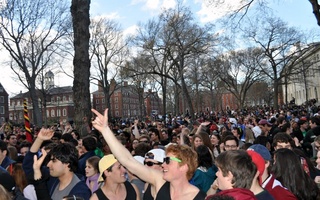Although these events were extremely well received, the ideal of a popular outdoor concert in Harvard Yard had yet to be realized.
“It was very important to me that Harvard Yard felt like it was the center of our campus. Although we lived in and walked through the Yard, it was rarely a place where College students could congregate comfortably,” says Haan, who stayed on after his graduation to become the campus life fellow at the Office of Student Activities, which has since been absorbed by the Office of Student Life.
In 2006, responsibility for planning the annual spring concert shifted from the Undergraduate Council to the Harvard Concert Commission and the newly minted College Events Board. Once again with support from Summers, students secured Ben Folds as the performer for Yardfest. Folds played to a jovial crowd of undergraduates who were throwing beach balls and flying on tire swings through the typically stately Yard.
With a system of event planning in place, which put students in charge of organizing the concert, Yardfest achieved more consistent attendance. Over 7,000 people showed to hear Sara Bareilles and Ratatat play in 2009. In 2010, Kid Cudi drew an audience of 4,500, followed by a crowd of over 7,000 for headliner Far East Movement in 2011, when Yardfest coincided with Visitas.
Though Yardfest has had successful years such as those, even its record audiences have paled in comparison to those of other schools. And since Yardfest has also failed to maintain audiences of those numbers, there’s still much to be reconciled with the original intention of a unifying, spirited event for students.
NO FUN WITHOUT FUNDING
That Yardfest has been firmly established as a yearly student-engineered event in Harvard Yard certainly stands as a victory for those who originally envisioned it. Yet according to many, it has failed to cement itself as an anticipated occasion in the social calendars of students at the College. Students throw around a number of explanations for why this has failed to be the case, with lack of adequate budget topping many’s lists.
Limited funds have hampered the planners of Yardfest from putting on the raging concert that they would hope to bring to life. “In my experience, the Faculty of Arts and Sciences, which sets the College’s budget, does not see the value in campus-wide events and as a result has not provided the College with a meaningful budget for these types of events,” Haan says.
At a university with an endowment that far outnumbers those of its peer institutions, one would imagine that funds for a student concert would be easily flowing. However, in 2012 The Crimson reported that student planners were constrained by the $30,000 in funds allocated by the OSL. The OSL would not disclose the budget for this year’s Yardfest. A prevailing assumption holds that other universities funnel much larger sums into their spring concerts, which Harvard students often lament are far superior to Yardfest.
One such event, Slope Day—an event at Cornell University on the last day of spring semester classes—allocated $167,523 to the concert portion of the day alone, with the entire budget totalling $316,934.26, in 2011. That year 17,500 attended the event, outnumbering the undergraduate student population of slightly over 14,000. Yang C. Zhao, Slope Day Chair, characterizes the event: “It’s a time when kids can look back on all the work they’ve done and just cut loose.”
The Slope Day Programming Board applies for funding via the Cornell Student Assembly every two years. The tuition and fees all Cornell undergraduates pay include a $229 student activity fee, from which the student government allocates $18 per student to fund Slope Day. Additional funds are made by selling tickets to alumni and guests of students, who can pay a $25 fee to attend if they purchase tickets over a week before the show.
At Penn, all students pay for tickets to attend the concert portion of Spring Fling. Tickets to the concert on Franklin Field purchased in advance cost $35 for students and $45 for the general public. Penn students can arrange for guest passes to the smaller music events and carnival activities that take place on Penn’s Quad, which are free for undergraduates.
Yet, at Harvard, the College remains committed to keeping Yardfest free of charge for students. “It is a high priority for the College to ensure that there are no barriers to participation to events that are designed to include the entire undergraduate student body,” Kenneth A. Parreno ’11, a student life fellow at the OSL, wrote in a statement to The Crimson.
Advocates of a ticketed concert say that the requirement to purchase a ticket may create a self-selecting group of hardcore concertgoers, while the rest of the student body chooses to spend their time elsewhere. “Because you have to purchase a ticket, I think the people that want to go are really excited about going,” Acevedo says. “However, the people who don’t go don’t feel left out because there’s other things going on at the same time, so there’s just always something to do.”
Yet some students appreciate that the event is free at Harvard. “I think when it actually comes to it, I like that it is free. I like that Harvard thinks a lot about economic concerns of people,” Acevedo remarks.
Read more in Arts
THUD to End Semester with a BangRecommended Articles
-
 Spring Concerts Around the Ivies
Spring Concerts Around the Ivies -
 YardFest: The Best Concert on April 15
YardFest: The Best Concert on April 15 -
Tyga Officially Announced as Yardfest HeadlinerTyga will headline this year’s Yardfest, according to an official announcement made by the College Events Board Wednesday evening nearly 20 hours after two students preemptively revealed the artist.
-
 "It's Going To Be Elegant, Dammit," Radcliffe Dance Organizers Promised in 1964
"It's Going To Be Elegant, Dammit," Radcliffe Dance Organizers Promised in 1964 -
Music "In Time of War"This Sunday, LGBT chorus Coro Allegro will perform their concert "...In Time of War," which will focuses on issues surrounding the armed forces. Works include Haydn's "Mass in Time of War" and a musical setting of a soldier's last letter home.
-
Tyga Retained as Yardfest Headliner with Start Time DelayedThe College Events Board and the Harvard College Concert Commission will retain rapper Tyga as the headliner for Yardfest, but will push back the start time of his performance on Saturday to accommodate students unhappy with the selection, the two organizations announced in a statement Monday night.













